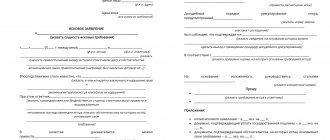In cases where there are no medical documents for a deceased citizen, an application to establish the fact of death will come to the rescue. Such cases are considered in a special proceeding and are derived from a statement to establish a fact of legal significance.
The reasons for filing such an application in court are most often the need to formalize an inheritance, the assignment of a survivor's pension and other legally significant circumstances.
Civil registry offices issue death certificates only upon provision of special documents: a certificate from a medical institution, a document on examination of the corpse. When such documents are missing, a death certificate will not be issued. But receiving a refusal from the registry office is a mandatory condition for the court to accept an application to establish the fact of death.
:
Statement on establishing the fact of death
Grounds for the court to establish the fact of death
The website provides recommendations and examples of statements similar in content:
- application for recognition as missing
- declaration of death.
Despite the similarity of statements, the evidence in civil cases differs. Because the range of circumstances to be proven is different.
When submitting applications from group 1, you must prove the fact that the citizen is absent from his place of permanent residence. And the lack of information about him. An application to establish the fact of death is submitted when the applicant (the one who applies) has reliable and irrefutable evidence of death. But he cannot confirm this fact with medical documents. For example, the hospital archive was destroyed, the doctor was not called on time (relevant for remote areas), etc.
How to prepare an application for establishing the fact of death
The application is submitted to the court at the place of residence of the person applying to establish the fact of death. It is for this person or his children that certain legal consequences must occur. For example, in our example, the mother, as the legal representative of the children, goes to court to ensure their rights.
The collection of evidence must be done carefully: this includes witness statements, appeals to the police, other authorities, certificates (for example, about a fire, flood). The purpose of filing an application to establish the fact of death determines the list of interested parties. However, the court in any case involves the guardianship authority and the prosecutor to participate in such cases.
Establishing the fact of death
Yu.I. FROLOVSKAYA, Yu.V. YUDINA
Frolovskaya Yulia Ivanovna, associate professor of the department of civil law and process of the Academy of Law and Management of the Federal Penitentiary Service, candidate of legal sciences, associate professor.
Yulia Viktorovna Yudina, Associate Professor of the Department of Civil Law and Process of the Academy of Law and Management of the Federal Penitentiary Service, Candidate of Legal Sciences, Associate Professor.
The article examines the procedural features of the procedure for considering cases on establishing the fact of registration of death, the fact of death under certain circumstances and at a certain time, as well as cases on declaring a citizen dead.
In accordance with civil law, inheritance opens with the death of a citizen <1>. The moment of a person’s death is the moment of his brain death or his biological death (irreversible death of a person). In Art. 66 of the Federal Law of November 21, 2011 N 323-FZ “On the fundamentals of protecting the health of citizens in the Russian Federation” uses three main provisions that characterize the main stages of the dying process, which give rise to certain legal consequences: clinical death, brain death, biological death. Clinical death, unlike subsequent stages of dying, cannot serve as a basis for declaring a person’s death, since it is a reversible stage of dying, characterized by the complete disappearance of all external signs of the body’s vital activity, in which hypoxia (oxygen starvation) does not cause irreversible changes in those sensitive to it organs and systems <2>.
———————————
<1> For details, see: Abramenkov M.S. Legal significance of opening an inheritance // Inheritance law. 2015. N 2. P. 6 - 9; Blinkov O.E. Memento mori // The Power of the Law. 2011. N 4. P. 43 - 53; Blinkov O.E. On the legal significance of death in a will // Inheritance law. 2012. N 2. P. 3 - 6; Blinkov O.E. Review of the conference: “Current problems of inheritance and international private law” // Legal world. 2006. N 10. P. 31 - 35; Mathieu M.L., Rostovtseva N.V. Inheritance by law in Russia and France: a comparative study // Inheritance law. 2014. N 4. P. 28 - 46.
<2> See: Gracheva T.Yu., Puchkova V.V., Korneeva O.V., Vakhrusheva Yu.N. Commentary on the Federal Law of November 21, 2011 N 323-FZ “On the fundamentals of protecting the health of citizens in the Russian Federation” // SPS “Garant”, 2014.
In accordance with Federal Law of November 15, 1997 N 143-FZ “On Acts of Civil Status”, the fact of death is subject to state registration, on the basis of which a death certificate is issued. The following documents are the basis for state registration of death. Firstly, a document on death, which is issued by a medical organization, an individual entrepreneur carrying out medical activities, or in the case provided for by Federal Law of June 5, 2012 N 50-FZ “On regulating the activities of Russian citizens and Russian legal entities in Antarctica”, other authorized person. Such a document is a medical death certificate, the form and procedure for issuing which are established in Order of the Ministry of Health and Social Development of the Russian Federation dated December 26, 2008 N 782n “On approval and procedure for maintaining medical documentation certifying cases of birth and death.”
Secondly, the basis for state registration of death is a court decision establishing the fact of death or declaring a person deceased, which has entered into legal force <3>.
———————————
<3> See: Yudina Yu.V. Declaring a person dead in the system of grounds for opening an inheritance // Inheritance law. 2007. N 1. P. 14 - 21.
Thirdly, such a basis may be a document issued by the competent authorities on the fact of the death of a person who was unreasonably repressed and subsequently rehabilitated on the basis of the law on the rehabilitation of victims of political repression.
Judicial determination of the fact of death occurs in a special procedure by district courts. In this order, in which various legal facts are established, a small number of cases are traditionally considered (compared to cases of litigation). According to official statistics, in 2013, 11,632,265 cases were considered in courts of general jurisdiction, of which only 349,049 (approximately 3%) were cases of special proceedings. Categories of cases of special proceedings according to statistics are quantitatively presented as follows: on establishing the fact of recognition of paternity - 8794 (2.5%), on recognizing a citizen as missing or declaring a citizen dead - 9732 (2.8%), on establishing other facts, having legal significance - 182387 (52.3%), on recognizing a citizen as having limited legal capacity - 397 (0.1%), on recognizing a citizen as incompetent - 27242 (7.8%), on restricting or depriving a minor aged 14 to 18 years of the right to dispose of their income - 65 (0.02%), on declaring a minor fully capable (emancipation) - 22 (0.01%), on recognizing a movable thing as ownerless and recognizing the right of municipal ownership to an ownerless immovable thing - 26209 (7, 5%), on the restoration of rights to lost bearer securities or order securities - 278 (0.08%), on the hospitalization of a citizen in a medical organization providing psychiatric care in an inpatient setting, on an involuntary basis and a psychiatric examination on an involuntary basis - 40116 (11.5%), cases on applications for notarial acts performed or refusal to perform them - 780 (0.2%), on correction of entries in the civil register - 7309 (2.1%), on the adoption of children - 15,806 (4.5%), on applications for the restoration of lost judicial proceedings - 150 (0.04%), other cases - 29,762 (8.5%). Of all categories of special proceedings, cases on establishing facts of legal significance account for 64.2% - 224,257 cases considered with a court decision.
In Part 2 of Art. 264 of the Civil Procedure Code of the Russian Federation (hereinafter referred to as the Civil Procedure Code of the Russian Federation), among the list of cases on establishing legally significant facts, the law speaks of the following: the fact of registration of death and the fact of death at a certain time and under certain circumstances. What unites these categories of cases is the following. Firstly, these are the facts that matter, i.e. the emergence, change, termination of personal or property rights of citizens and organizations depends on their establishment. In this regard, the application must indicate the purpose for which the applicant needs to establish this fact. Secondly, there is no dispute about the law. Moreover, the court must find out the circle of interested parties, whether the rights and legitimate interests of other persons have been violated, and whether the person is hiding from any responsibility or punishment. Thirdly, it is not possible for the interested party to obtain the appropriate documents certifying these facts in any other (out-of-court) manner, or it is impossible to restore lost documents.
These categories of cases should be distinguished according to the subject of proof. Since, when establishing the fact of registration of death, the court establishes this fact if such registration on the basis of established documents was previously carried out, but the vital record was not preserved, was lost, or for other reasons the civil registry office refuses to issue a repeat death certificate.
When establishing the fact of death, since the registration of the fact of death by the civil registry office was not carried out, it is necessary to establish the event of the death of a person under certain circumstances and at a certain time. In this case, the evidence must reliably confirm the fact of death. Then you should provide evidence that the civil registry office refused to register the fact of death. In accordance with Art. 11 of the Federal Law of November 15, 1997 N 143-FZ “On Acts of Civil Status”, refusal of state registration of a civil status act is allowed in cases where 1) state registration contradicts the above law; 2) the documents submitted do not comply with the requirements set by law. The head of the civil registry office is obliged to inform the person (or his representative) of the reasons for such refusal in writing, if they so request. A refusal to state register a death may be appealed by an interested person to the executive body of a constituent entity of the Russian Federation, whose competence includes organizing activities for state registration of acts of civil status, to the territorial body of the authorized federal executive body exercising control and supervision functions in the field of state civil registration, or to court.
Establishing the fact of the death of a person under certain circumstances and at a certain time should be distinguished from declaring a citizen dead. Firstly, when establishing the fact of death, it is not necessary to comply with the time period of absence of information about the place of residence of the person (when declaring a citizen dead, the absence of information about the place of residence of the citizen at his place of residence for 5 years is required, and if he went missing under circumstances that threatened or giving reason to assume his death from a certain accident - within 6 months). Secondly, declaring a citizen dead is a probabilistic judgment (“presumption of death”) about the death of a person, but does not exclude the possibility that this person may be alive. Therefore, the law provides for the possible consequences of the appearance or discovery of a person declared dead (Article 46 of the Civil Code of the Russian Federation). This complicates the process of proving the case. Thirdly, evidence must be presented to the court (witness testimony, written or physical evidence, expert opinions, audio or video recordings) that would allow the court not to doubt the death of this person. And also often, when considering such cases, it remains outside the scope of the judicial process to clarify the existence of various kinds of obligations of the person whose death the case is being heard about, the possibility of bringing him to justice or punishment.
An application to establish the fact of death is submitted to the district court at the applicant’s place of residence. At the same time, the law says that any interested person can make such a statement, regardless of family relations with the deceased. Various international treaties of the Russian Federation provide for recognition of the death of a person who is a citizen of a foreign state.
So, for example, in cases of recognizing a person as missing or declaring a person dead and in cases of establishing the fact of death, the justice institutions of the contracting party, whose citizen the person was at the time when, according to the latest data, he was alive, are competent, and in relation to other persons - justice institutions at the person’s last place of residence.
The justice institutions of each of the contracting parties may recognize a citizen of the other contracting party and another person residing on its territory as missing or dead, and also establish the fact of his death at the request of interested persons living on its territory, whose rights and interests are based on the legislation of this contracting party. sides. When considering cases of recognition as missing or declared dead and cases of establishing the fact of death, the justice institutions of the contracting parties apply the legislation of their state <4>.
———————————
<4> See, for example: art. 25 of the Convention on Legal Assistance and Legal Relations in Civil, Family and Criminal Matters” (concluded in Minsk on January 22, 1993, entered into force on May 19, 1994, for the Russian Federation - December 10, 1994); Agreement between the Russian Federation and the Republic of Moldova on legal assistance and legal relations in civil, family and criminal cases (signed in Moscow on February 25, 1993); Agreement between the Russian Federation and the Republic of Latvia on legal assistance and legal relations in civil, family and criminal cases (signed in Riga on 02/03/1993).
The court decision in the case of establishing the fact of death must contain, as accurately and in detail as possible, all the information necessary for the subsequent registration of the fact of death by the civil registry office, since this decision itself does not replace the death certificate, but is the basis for its issuance (Article 268 of the Code of Civil Procedure of the Russian Federation). In accordance with Art. 67 Federal Law of November 15, 1997 N 143-FZ “On acts of civil status” the following information is entered into the death certificate record: full name, date and place of birth, last place of residence, gender, citizenship, nationality (if information about nationality is indicated in identification document of the deceased), date and place of death of the deceased; cause of death, details of the document confirming the fact of death; Full name, place of residence of the applicant or name and legal address of the body, organization or institution that made the declaration of death; series and number of the issued death certificate; Full name, place of residence of the person to whom the death certificate was issued.
So, such categories of cases as establishing the fact of death, establishing the fact of registering death, declaring a citizen dead are categories of cases of special proceedings that differ significantly in the subject of proof, the volume of evidence, and the procedural order of their consideration.
Literature
1. Abramenkov M.S. Legal significance of opening an inheritance // Inheritance law. 2015. N 2. P. 6 - 9.
2. Blinkov O.E. Memento mori // The Power of the Law. 2011. N 4. P. 43 - 53.
3. Blinkov O.E. On the legal significance of death in a will // Inheritance law. 2012. N 2. P. 3 - 6.
4. Blinkov O.E. Review of the conference: “Current problems of inheritance and international private law” // Legal world. 2006. N 10. P. 31 - 35.
5. Gracheva T.Yu., Puchkova V.V., Korneeva O.V., Vakhrusheva Yu.N. Commentary on the Federal Law of November 21, 2011 N 323-FZ “On the fundamentals of protecting the health of citizens in the Russian Federation” // SPS “Garant”, 2014.
6. Mathieu M.L., Rostovtseva N.V. Inheritance by law in Russia and France: a comparative study // Inheritance law. 2014. N 4. P. 28 - 46.
7. Yudina Yu.V. Declaring a person dead in the system of grounds for opening an inheritance // Inheritance law. 2007. N 1. P. 14 - 21.
Source: INHERITANCE LAW magazine
Court decision in the case
Making a decision will not exempt you from applying to the registry office to obtain a death certificate. In this case, the death of a person is established in relation to a certain time and circumstances.
The date of death of a citizen when a court decision is made will be the day specified by the court in the decision (if it is established that the citizen died under certain circumstances on the specified day).
It is necessary to distinguish an application for establishing the fact of death from an application for establishing the fact of registration of death; in case of doubt, ask questions to the duty lawyer.
Why is it necessary to establish the fact of death in court?
People often go missing when there is no information from them. After a certain time, such a person can be declared dead in court.
It happens that a person disappears as a result of an accident, the nature of which gives every reason to talk about his death.
Such circumstances include:
- plane crash;
- tragedy on the water;
- fire;
- snow avalanche.
Sometimes in such situations the body cannot be found. Accordingly, relatives are denied a medical certificate confirming the death of a person.
Without this document, it is impossible to register a death with the civil registry office. Therefore, the only way out of this situation is to register the fact of death by the court within the framework of special proceedings.
When the corresponding decision comes into force, you can already order a death certificate from the registry office. Having received it in your hands, you should start processing the inheritance, pension and other necessary formalities.




